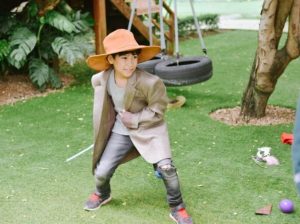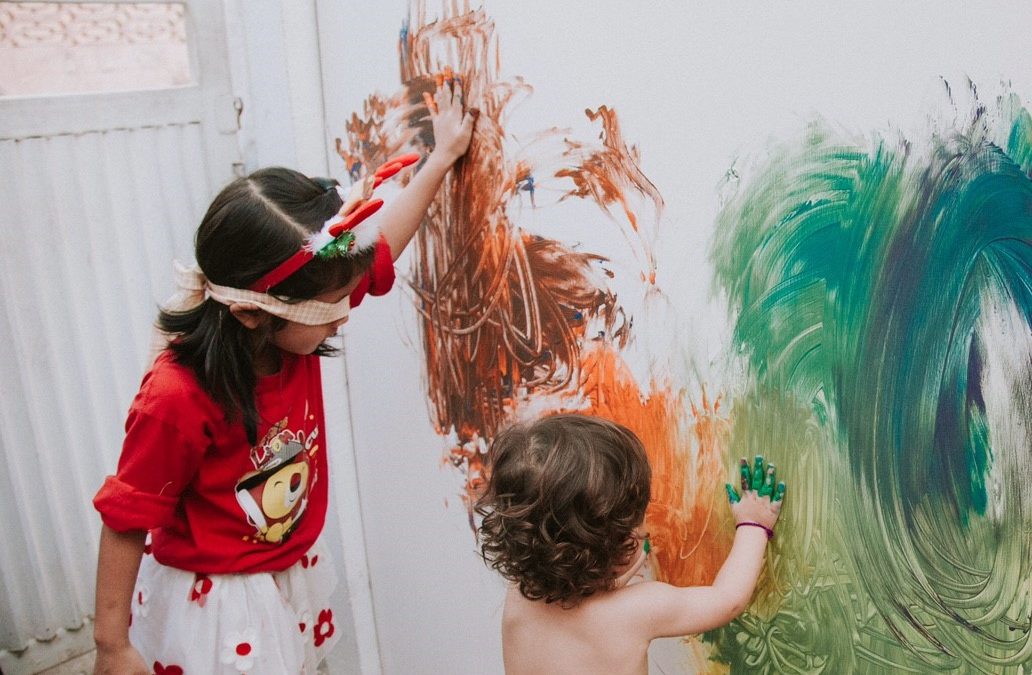Creative Drama can play such an important role in a child’s development.
“Of all the arts, drama involves the participant the most fully: intellectually, emotionally, physically, verbally, and socially. As players, children assume the roles of others, and they learn about becoming more sensitive to the problems and values of persons different from themselves. At the same time, they are learning to work cooperatively, for drama is a communal art; each person is necessary to the whole.”

Creative Drama for kids
Creative drama activities offer an opportunity for children to:
- Expand self-awareness
- Develop imagination
- Think independently
- Work cooperatively
- Improve communication skills
- Express a healthy release of emotions
- Build social awareness
In essence, creative drama is dramatic activities which have the experience of the participants as the goal. Creative drama can include dramatic play, story enactment, imagination journeys, theatre/drama games, music, and dance. “Let’s pretend” is the norm in creative drama class, it’s not just a child’s game.
Because the emphasis in creative drama is process rather than product, teachers should have the freedom to take as much time as needed with their classes. When a student in a creative drama class prefers to watch instead of participate, because of shyness or fear, a teacher should be able to allow this also. The teacher can also become a participant at any stage and let the children lead the activities rather than being guided through them. Creative drama can help children learn about emotions, problem solving, and relating to other people. Through their experiences with drama, students develop their imaginations and their confidence. One of the most special things about creative drama is that there are no “wrong” answers – through pretending, animals can talk, kids can travel to outer space or the jungle, and the sky can be green while the grass is blue.

Creative Drama for Children
Dramatic play is so important in all stages of child development. Through creative dramatic activities:
- Children learn about themselves and the world. Dramatic play experiences are some of the first ways children learn about their likes and dislikes, their interests, and their abilities. They experiment with role playing and work to make sense out of what they’re observing in real life.
- Children work out confusing, scary, or new life issues. Have you ever witnessed children pretending to visit the doctor? One child dutifully holds the mock stethoscope as the others line up for a check-up. Through these role plays, children become more comfortable and prepared for life events in a safe way. Children often use pretend play to work out more personal challenging life events too, whether it is coping with an illness in the family, or the absence of a parent or divorce.
- Children develop important complex social and higher order thinking skills. Dramatic play is much more than simple play activities; it requires advanced thinking strategies, communication, and social skills. Through dramatic play, children learn to do things like negotiate, consider others’ perspectives, transfer knowledge from one situation to another, delay gratification, balance their own ideas with others, develop a plan and act on it, express and listen to thoughts and ideas, assign tasks and roles, and create different information and ideas. In this creative play description, we could just as easily be describing the skills needed to successfully manage a work project for an adult as describing children’s dramatic play.
- Children cultivate social and emotional intelligence. How we interact with others is key to our lifelong success and happiness. Knowing how to read social cues, recognize and regulate emotions, negotiate and take turns, and engage in a long-term activity that is mutually beneficial are no easy tasks. There is no substitute for creative and imaginative play when it comes to teaching and enhancing these abilities in children.
- Children create knowledge and skills. Because learning and child development doesn’t happen in discrete pockets of time or during isolated activities, children need opportunities to blend their skills and knowledge together. Dramatic play is an ideal way to do this. Think of children acting out a ‘supermarket’ scenario. They take on roles such as shopkeeper, shop assistant and customers working collaboratively they are interacting and engaging with one another, using their imaginations to help make sense of the world around them.
For all these reasons, play and games are a huge part of MasterClass Studio’s classes. We believe that the process, the development and the personal impact creative drama has on the child far outweighs the end product, particularly with young children.
Time and again parents communicate to us how MasterClass Studio classes have improved their child’s confidence, sense of self and social skills. We believe strongly in the value of creative drama for a child’s development – come sign up for a Try for Free day to witness it yourself!

